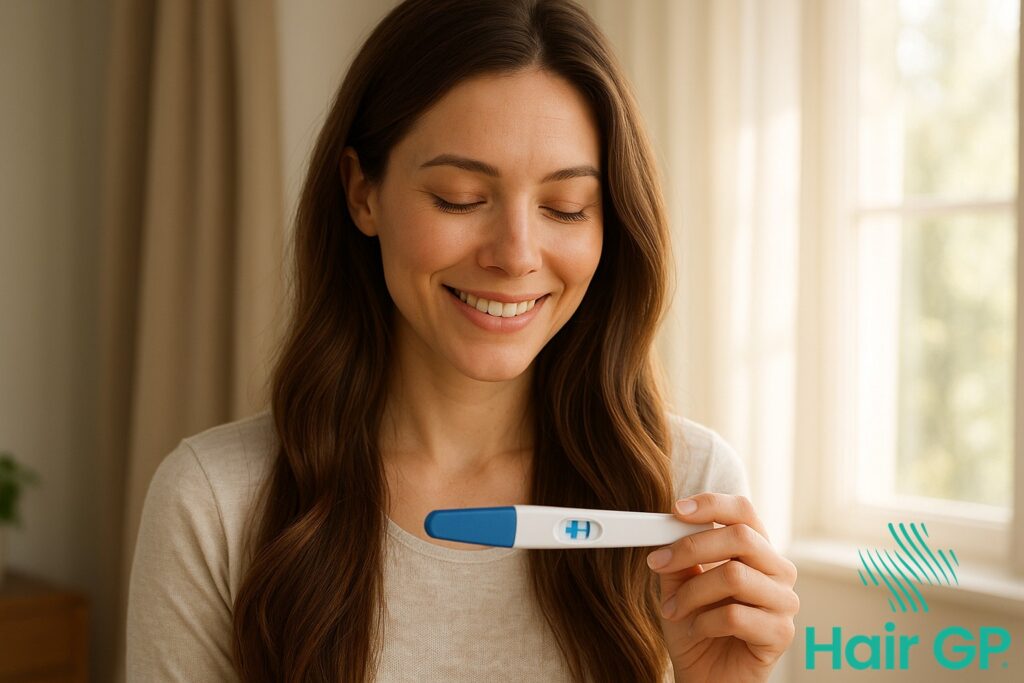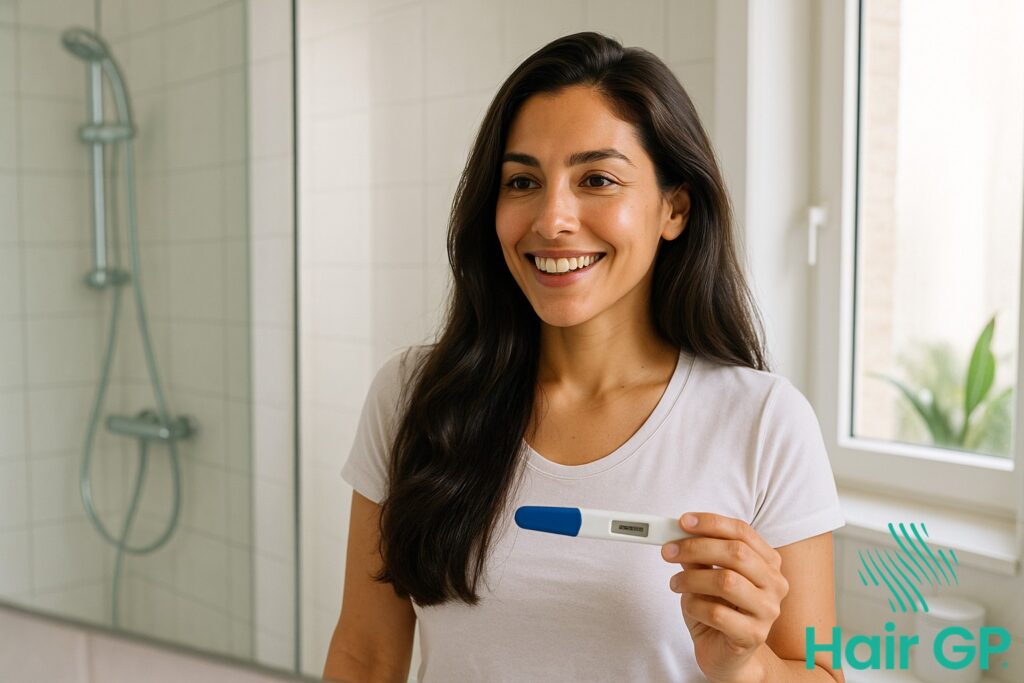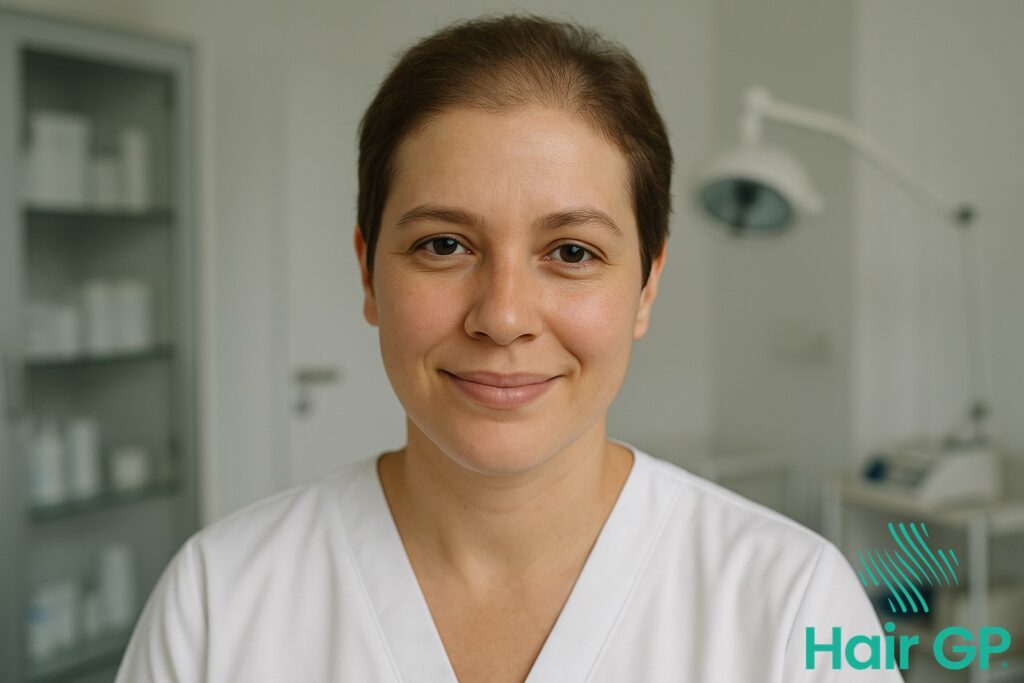Hair Loss During Fertility Treatment: Beyond IVF Protocols
Introduction
For many individuals embarking on their fertility journey, the focus naturally centres on achieving pregnancy. However, an unexpected side effect that often catches people off guard is hair loss during fertility treatment. Whilst much attention has been given to the effects of IVF protocols on hair health, the reality is that various forms of assisted reproductive technology can impact your hair in different ways.
If you’re experiencing thinning hair or increased shedding during fertility treatments, you’re not alone. These changes, though distressing, are typically temporary and result from the complex hormonal imbalances that fertility medications create. Understanding why this happens and knowing what to expect can help alleviate anxiety during an already emotionally challenging time.
This comprehensive guide explores the intricate relationship between fertility treatments and hair health, looking well beyond standard IVF cycles. We’ll examine how different hormones affect your hair follicles, review various treatment options and their unique impacts on hair growth, and provide practical strategies for managing these changes. You’ll discover evidence-based approaches to support your hair during treatment, from tailored care routines to nutritional interventions that can make a real difference.
Most importantly, we’ll address recovery and long-term care, helping you understand when hair regrowth typically begins and how to support this process. Whether you’re currently undergoing treatment or planning your fertility journey, this guide offers the knowledge and reassurance you need to navigate hair changes with confidence.
Key Takeaways – TL/DR
- Hair loss affects up to 40% of women undergoing fertility treatments, not just IVF
- Hormonal fluctuations from ovulation induction and other protocols can trigger temporary hair shedding
- Most treatment-related hair loss is reversible within 6-12 months post-treatment
- Proper nutrition, stress management, and gentle hair care can minimize impact
- Alternative fertility treatments like letrozole and clomiphene citrate also affect hair health
Understanding Hair Loss in Fertility Treatment
The relationship between fertility treatments and hair loss extends beyond simple cause and effect, involving complex hormonal shifts that disrupt normal hair growth patterns. Understanding these mechanisms helps patients recognise that whilst hair loss during IVF treatment can be distressing, it typically represents a temporary response to hormonal changes rather than permanent damage.
The Hair Growth Cycle During Treatment
Fertility treatments, particularly those involving ovarian stimulation, can trigger telogen effluvium—a condition where hair follicles prematurely enter the resting phase [1]. During normal circumstances, approximately 10-15% of scalp hair remains in the telogen phase. However, the hormonal fluctuations associated with in vitro fertilization can cause up to 30% of follicles to shift from the active anagen phase to telogen simultaneously.
This anagen to telogen shift typically manifests 2-3 months after beginning treatment, as follicles complete their resting phase and shed. The delay between treatment initiation and visible hair loss often causes confusion, with patients incorrectly attributing shedding to current medications rather than earlier hormonal changes. Most individuals notice increased hair fall during shampooing or brushing, with daily losses exceeding the normal 50-100 strands.
Common Misconceptions About Treatment-Related Hair Loss
One prevalent misconception suggests that hair loss from fertility treatments indicates permanent follicular damage. Research demonstrates that treatment-induced telogen effluvium resolves spontaneously within 6-12 months following hormonal stabilisation [2]. The follicles remain intact and capable of producing new growth once normal cycling resumes.
Genetic predisposition plays a minimal role in treatment-related shedding, unlike androgenetic alopecia. Patients with family histories of pattern baldness experience similar temporary losses to those without genetic risk factors. Additionally, the intensity of reproductive health interventions doesn’t directly correlate with hair loss severity—some individuals undergoing minimal stimulation protocols experience significant shedding, whilst others completing multiple high-dose cycles maintain normal hair density. This variability reflects individual hormonal sensitivity rather than treatment aggressiveness, underscoring the importance of personalised expectations and management strategies during fertility treatments.
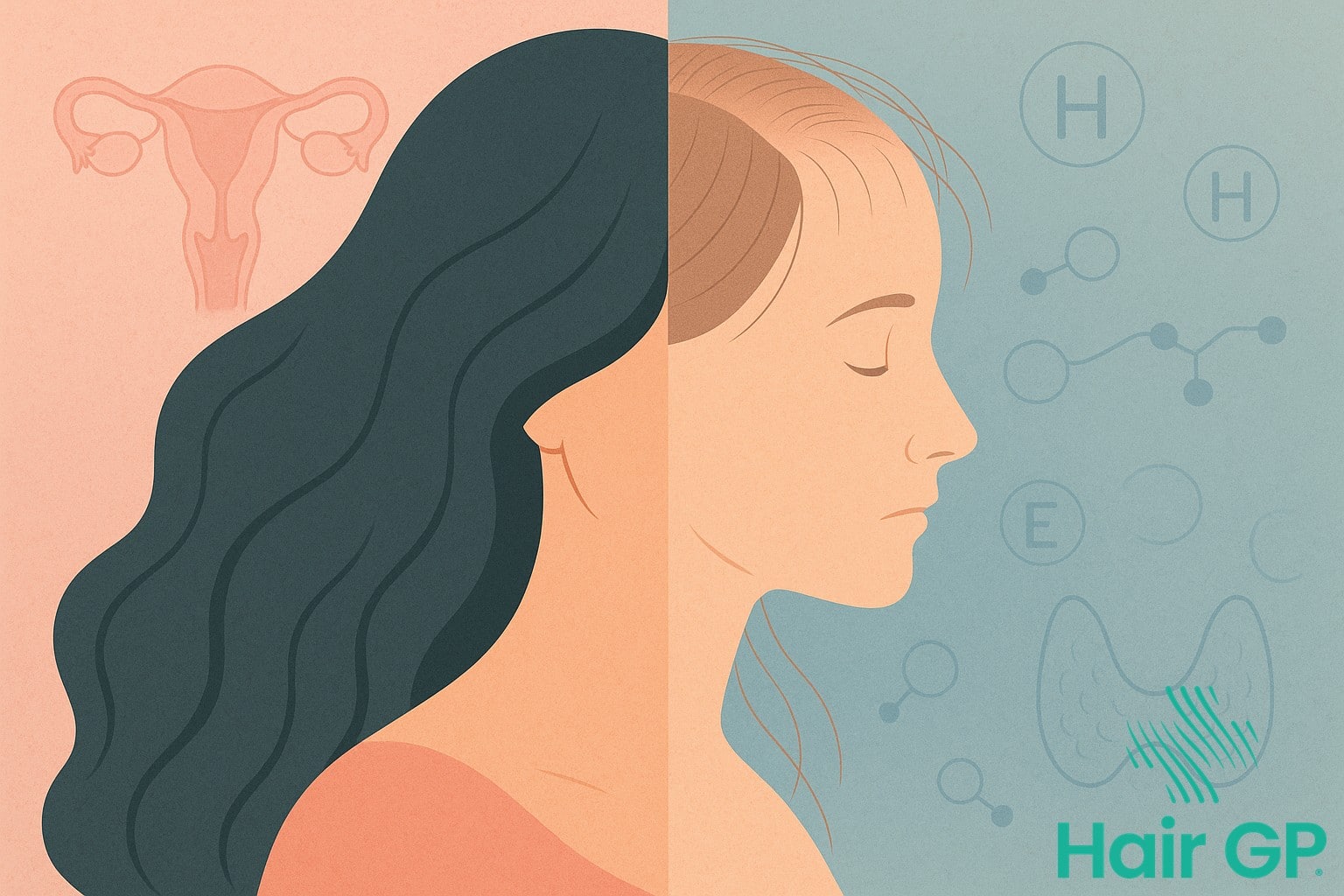
Hormonal Causes Beyond IVF Cycles
Whilst IVF protocols receive significant attention, various fertility treatments can trigger hormonal imbalances that profoundly affect hair health. Understanding how different reproductive hormones influence hair follicles helps explain why hair loss occurs across multiple treatment modalities, from ovulation induction to hormone replacement therapies.
Oestrogen and Progesterone Fluctuations
Oestrogen serves as a powerful protector of hair follicles, extending the anagen (growth) phase and promoting thicker, healthier hair. During fertility treatments, oestrogen levels can fluctuate dramatically, rising to supraphysiological levels during stimulation before plummeting post-treatment[3]. This protective effect explains why many women experience lustrous hair during pregnancy when oestrogen remains elevated.
Conversely, progesterone withdrawal following unsuccessful cycles or medication cessation can trigger telogen effluvium. The abrupt hormonal shift pushes numerous follicles simultaneously into the resting phase, resulting in diffuse shedding approximately 2-3 months later. These cycle-dependent changes create a rollercoaster effect on hair health, with periods of retention followed by significant loss.
Androgen-Related Hair Loss in PCOS Patients
Women with polycystic ovary syndrome (PCOS) face unique challenges during fertility treatment. Elevated androgens, particularly testosterone and dihydrotestosterone, directly miniaturise hair follicles, causing androgenetic alopecia[4]. This process predominantly affects the crown and frontal scalp regions, creating a distinct pattern of thinning.
The insulin resistance commonly accompanying PCOS further exacerbates androgen production, creating a vicious cycle. Fertility treatments must carefully balance stimulating ovulation whilst avoiding excessive androgen elevation. Treatment modifications often include anti-androgen medications like spironolactone (contraindicated during active conception attempts) or metformin to address underlying insulin resistance, helping preserve hair health whilst pursuing pregnancy.
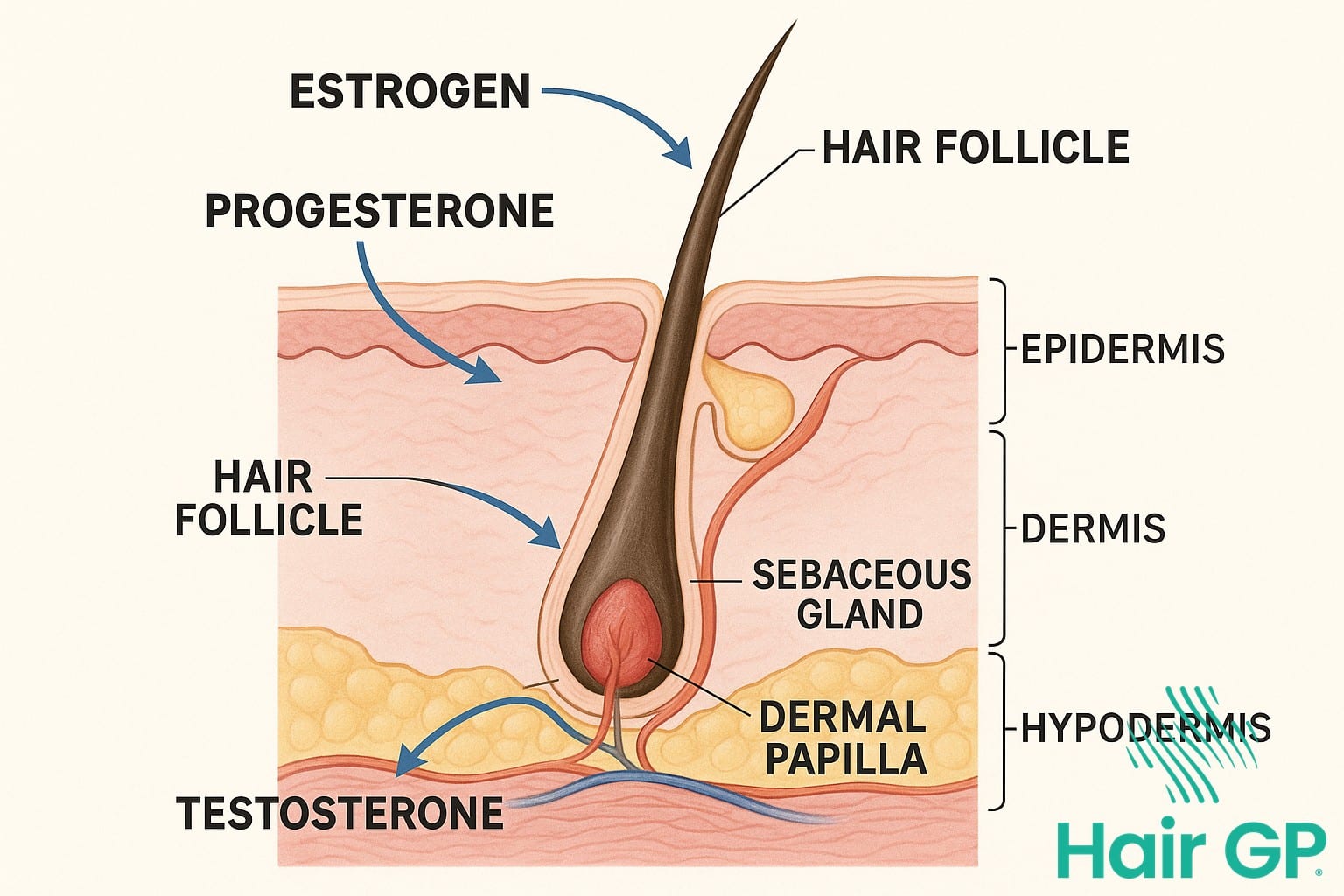
Alternative Fertility Treatments and Hair Impact
Whilst IVF receives significant attention regarding hair-related side effects, various alternative fertility treatments present different impacts on hair health. Understanding these variations helps patients make informed decisions about their treatment options whilst preparing for potential cosmetic changes during their fertility journey.
Ovulation Induction Medications
Ovulation induction represents a first-line approach for many fertility patients, with medications varying considerably in their hair-related effects. Clomiphene citrate (Clomid), one of the most prescribed fertility drugs, can occasionally cause hair thinning in approximately 3% of users, typically manifesting after 2-3 cycles of treatment[1]. However, letrozole, an aromatase inhibitor, demonstrates a more favourable profile regarding hair retention, with studies indicating minimal impact on hair follicles compared to traditional ovulation stimulants[2]. Dosage considerations prove crucial—lower doses of these medications often minimise hair-related side effects whilst maintaining therapeutic efficacy. Patients typically notice any hair changes within 6-12 weeks of starting treatment, with effects generally reversing within three months of discontinuation.
IUI and Minimal Stimulation Protocols
Intrauterine insemination (IUI) protocols, particularly those employing minimal stimulation, offer gentler alternatives that typically produce less dramatic hormonal fluctuations. Natural cycle IUI, which involves no medication, eliminates drug-related hair concerns entirely. When medications are necessary, mini-IVF protocols utilising lower hormone doses—typically 50-75% of conventional IVF dosages—significantly reduce the risk of telogen effluvium. These approaches particularly benefit patients with pre-existing hair conditions or those concerned about cosmetic side effects. The reduced follicle recruitment in minimal stimulation protocols correlates with lower oestrogen peaks, thereby minimising the hormonal shock that often triggers hair shedding.
Natural Conception Support Treatments
Natural fertility enhancement approaches focus on optimising overall health whilst supporting hair vitality. Vitamin supplementation, particularly B-complex vitamins, iron, and vitamin D, addresses common deficiencies that affect both fertility and hair growth. Acupuncture, whilst primarily targeting reproductive function, may improve scalp circulation and reduce treatment-related stress, potentially mitigating hair loss. Dietary modifications emphasising omega-3 fatty acids, lean proteins, and antioxidant-rich foods support both follicular development and hair health simultaneously, offering a holistic approach to fertility treatment.
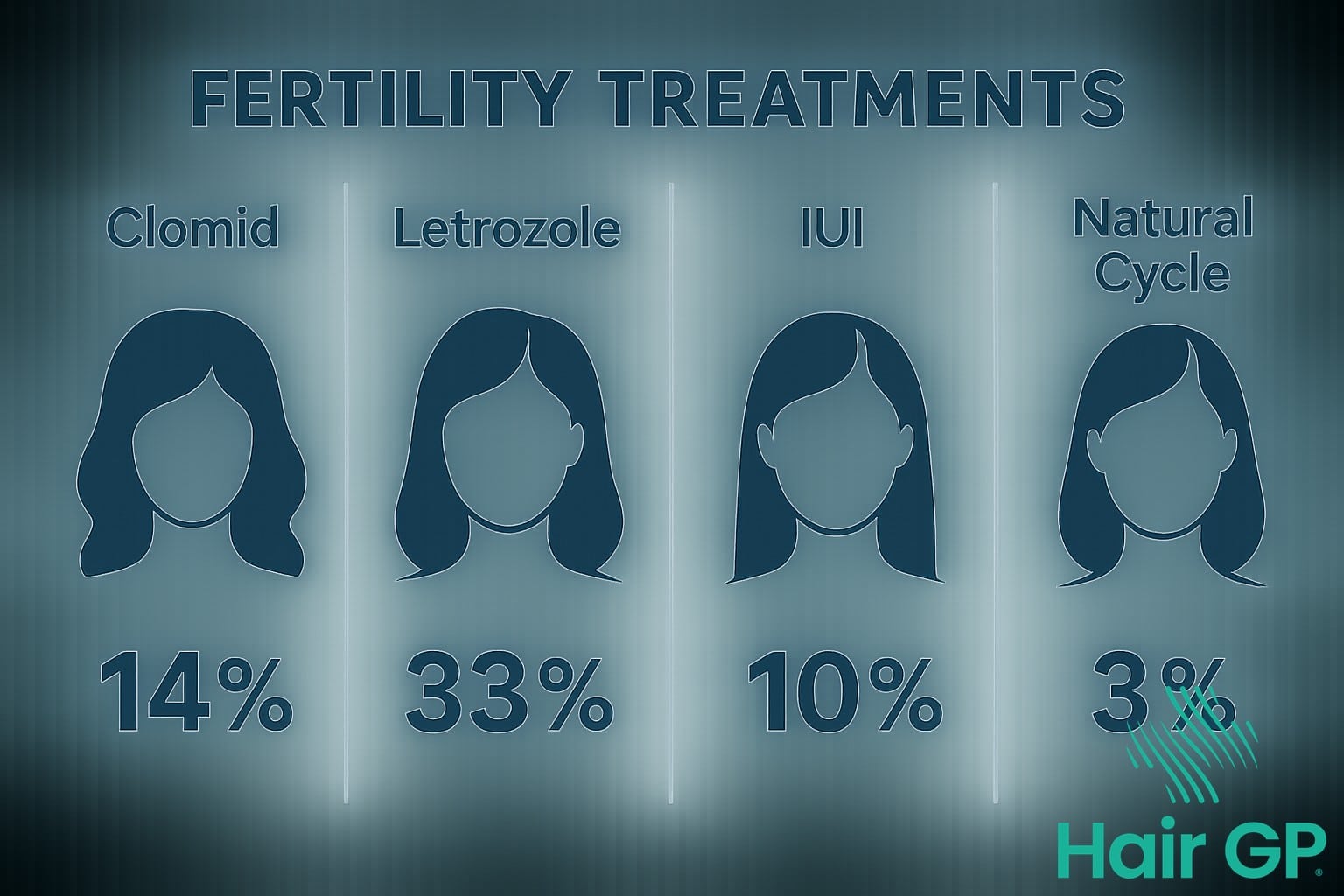
Managing Hair Loss During Treatment
Managing hair loss during fertility treatment requires a proactive approach combining targeted nutritional support with effective stress management techniques. By implementing specific lifestyle changes, patients can significantly minimise hair loss whilst undergoing treatment, supporting both their physical and emotional wellbeing throughout the fertility journey.
Nutritional Support for Hair Health
Proper nutrition forms the foundation of healthy hair maintenance during fertility treatments. Adequate protein intake proves essential, with research suggesting 1.2-1.6 grams per kilogram of body weight daily to support follicle health[1]. Iron deficiency remains a common culprit in hair loss, particularly amongst women of reproductive age, making iron-rich foods and monitoring ferritin levels crucial components of appropriate treatment.
B vitamins, particularly B12, play vital roles in cellular metabolism and hair growth. Studies demonstrate that B-complex supplementation can improve hair thickness and reduce shedding when combined with adequate protein intake[2]. Omega-3 fatty acids from sources like salmon, walnuts, and flaxseeds provide anti-inflammatory benefits that protect hair follicles from oxidative stress.
Stress Reduction Techniques
The connection between psychological stress and hair loss intensifies during fertility treatments, making stress management essential. Regular meditation practice, even just 10-15 minutes daily, has shown measurable benefits in reducing cortisol levels and supporting hair retention. Mindfulness-based stress reduction programmes specifically designed for fertility patients offer structured approaches to managing treatment-related anxiety.
Gentle exercise provides dual benefits—reducing stress hormones whilst improving circulation to hair follicles. Low-impact activities like yoga, swimming, or walking for 30 minutes daily prove ideal during treatment cycles. Support groups, whether in-person or online, offer invaluable emotional outlets where patients can share experiences and coping strategies, reducing the isolation often accompanying fertility challenges.

Recovery Strategies and Long-Term Care
Recovery from fertility treatment-related hair loss requires patience and proper care strategies to support the natural regrowth process. Understanding the typical recovery timeline helps manage expectations whilst establishing when additional support might be needed for optimal hair restoration.
Post-Treatment Recovery Timeline
Hair recovery following fertility treatments typically follows a predictable pattern, though individual experiences vary. The initial three months after treatment completion often involve continued shedding as follicles transition through growth phases[1]. This temporary increase in hair loss, whilst distressing, represents the natural telogen effluvium recovery process. By month six, most women who successfully conceive through IVF notice visible regrowth signs, with baby hairs appearing along the hairline and crown. Complete recovery generally occurs within 12 months post-treatment, coinciding with hormonal stabilisation after pregnancy or following unsuccessful embryo transfer cycles[2].
When to Seek Additional Help
Whilst most hair loss resolves naturally, certain warning signs warrant consultation. Persistent hair loss extending beyond six months after egg retrieval completion, particularly when accompanied by scalp inflammation or unusual patterns, requires professional assessment. Underlying issues such as thyroid dysfunction or nutritional deficiencies can compound fertility treatment effects. Women experiencing patchy hair loss, scalp pain, or continued thinning despite achieving IVF success should seek specialist evaluation. Additionally, those unable to become pregnant after multiple cycles may benefit from comprehensive hormonal assessment, as prolonged treatment stress can perpetuate hair loss cycles requiring targeted intervention.
Conclusion
Hair loss during your fertility journey represents yet another challenge in an already emotionally demanding process. Whether you’re navigating the IVF journey or exploring other paths to conceiving, understanding that hair changes are both common and typically temporary can provide reassurance. The hormonal fluctuations inherent in treating infertility affect multiple body systems, with hair follicles being particularly sensitive to these shifts.
Prioritising self-care becomes essential, not merely for aesthetic concerns but for overall wellbeing throughout treatment. Simple measures like maintaining adequate nutrition, managing stress levels, and following your clinic’s guidance on lifestyle modifications can significantly impact both hair health and fertility outcomes. Some women find that efforts to lose weight, when medically advised, help regulate hormones and improve treatment response whilst potentially benefiting hair growth.
Remember that patience remains crucial – hair regrowth typically begins three to six months after hormonal balance restoration. Your medical team can provide personalised strategies to minimise hair loss whilst optimising fertility treatment success. Most importantly, be gentle with yourself. This temporary side effect doesn’t diminish your strength or determination. Focus on the ultimate goal whilst implementing supportive measures for your physical and emotional health throughout this transformative journey.
Frequently Asked Questions
Yes, in most cases hair loss from fertility treatments is temporary. Most women see significant regrowth within 6-12 months after completing treatment, as hormone levels normalise and hair follicles return to their regular growth cycle.
While you may not completely prevent hair loss, you can minimise it through proper nutrition, gentle hair care, stress management, and working with your fertility clinic to adjust protocols when possible. Some patients benefit from preventive supplements like biotin and iron.
Hair loss severity varies by individual and treatment type. While IVF often involves higher hormone doses, some patients experience more hair loss with medications like Clomid. The key factor is how your body responds to hormonal changes rather than the specific treatment.
Never stop treatment without consulting your fertility specialist. Severe hair loss should be discussed with your care team, who can evaluate whether protocol adjustments are appropriate while maintaining treatment effectiveness for your fertility journey.
References
- Grover C, Khurana A. Telogen effluvium. Indian J Dermatol Venereol Leprol. 2013;79(5):591-603.
- Asghar F, Shamim N, Farooque U, Sheikh H, Aqeel R. Telogen Effluvium: A Review of the Literature. Cureus. 2020;12(5):e8320.
- Grymowicz M, Rudnicka E, Podfigurna A, et al. Hormonal Effects on Hair Follicles. Int J Mol Sci. 2020;21(15):5342.
- Azziz R, Carmina E, Chen Z, et al. Polycystic ovary syndrome. Nat Rev Dis Primers. 2016;2:16057.

